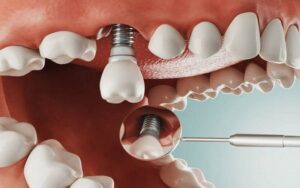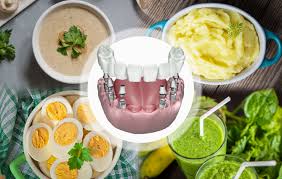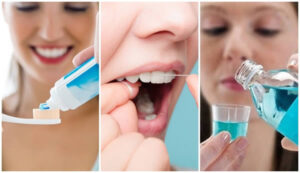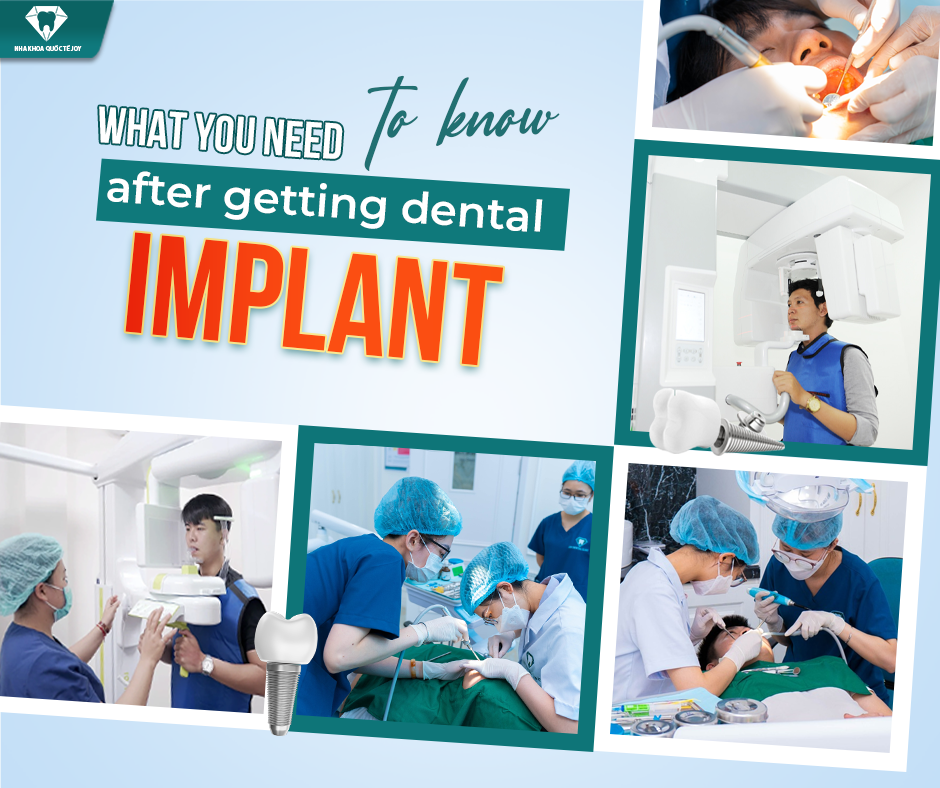Dental implants are considered one of the most advanced and effective methods for replacing missing teeth. They not only restore aesthetics but also bring back natural chewing function, helping you regain your confidence in daily life. However, the success of a dental implant doesn’t stop at surgery. Proper post-operative care plays a vital role in ensuring the implant integrates well with the jawbone and remains durable over time. If you’re wondering what you need to know after getting dental implant, Joy International Dental Clinic is here to guide you through everything you need to know.
1. Why Post-Implant Care Matters

After dental implant placement, your body begins a healing process where the implant post integrates with your jawbone through a process called osseointegration. This can take several weeks to a few months. During this crucial period, any improper care or neglect can lead to complications such as infections, gum recession, or even implant failure.
Without appropriate post-surgical care, there’s a risk of implant rejection, inflammation, pain, and additional costs for revision surgery. Therefore, understanding and following the right care instructions is essential for long-term success and a healthy smile.
2. Key Guidelines After Dental Implant Surgery
2.1. Be Mindful of Your Diet

In the first few days after implant placement, your mouth will be tender. You should stick to soft, lukewarm foods such as mashed potatoes, yogurt, smoothies, oatmeal, and warm soups. These foods are easy to chew and won’t disturb the surgical area.
Avoid crunchy, hard, spicy, or hot foods that can irritate the implant site. Also, refrain from chewing on the side of the implant until your dentist gives you the green light. As healing progresses, you can gradually return to your regular diet—just remember to chew gently and avoid unnecessary pressure on the implant area.
2.2. Follow Your Dentist’s Instructions Strictly
Every implant case is different depending on the patient’s health condition and surgical complexity. That’s why post-operative instructions from your dentist should be considered your roadmap to recovery.
Whether it’s regarding how and when to take medications, when to resume normal activities, or the timing for follow-up appointments—strictly following your dentist’s advice can significantly reduce healing time and help you avoid complications. If you’re unsure about anything, don’t hesitate to ask your dentist for clarification.
2.3. Take Prescribed Medications on Schedule

Pain, swelling, and minor discomfort are normal after implant surgery. Dentists usually prescribe antibiotics to prevent infection and anti-inflammatory or pain-relieving medications. It’s essential that you take them exactly as prescribed—do not skip doses, and avoid self-medicating or stopping early even if you feel better.
Over-the-counter medications or herbal supplements should only be used with your dentist’s approval, as they can interfere with healing or interact with your prescription.
2.4. Maintain Excellent Oral Hygiene

Good oral hygiene is one of the most important factors for implant longevity. However, cleaning the area around the implant needs to be done gently to avoid disrupting the healing site.
For the first few days, avoid brushing directly over the implant site. Instead, rinse with warm saline solution (salt water) or an antiseptic mouthwash if prescribed. After the first week, you can resume gentle brushing using a soft-bristled toothbrush. Flossing and using an interdental brush can also help keep the surrounding area clean—just be careful not to irritate the implant site.
2.5. Avoid Strenuous Activity and Exercise
Your body needs time to heal after surgery, and physical exertion in the early stages can cause complications such as bleeding or swelling. Avoid heavy lifting, running, or intense exercise for at least 48–72 hours after surgery. Prioritize rest and get plenty of sleep to support your body’s natural healing process.
If you experience increased pain, bleeding, or swelling after physical activity, contact your dentist immediately.
2.6. Need to know after getting dental implant you do not smoke or use tobacco products

If you’re a smoker, it’s strongly advised to quit smoking at least 2–4 weeks before and after the procedure. Nicotine restricts blood flow and hampers the body’s ability to heal. Smoking can significantly increase the risk of implant failure due to infections and delayed bone integration.
Even vaping or using smokeless tobacco can negatively affect the healing process. For your long-term oral and general health, consider using this opportunity to quit smoking altogether.
2.7. Avoid Touching or Applying Pressure to the Implant Area
It’s natural to feel curious about the implant site, but it’s important to avoid touching it with your fingers or tongue. This can introduce bacteria or disturb the healing tissues.
Likewise, avoid bad habits like nail-biting, chewing on ice, or using your teeth to open packages. These actions can dislodge the implant or affect the surrounding gums and bones, compromising the outcome of the procedure.
3. Long-Term Tips for Implant Maintenance
Even after the implant has healed and is fully functional, ongoing care is crucial. Some helpful habits include:
-
Brushing twice daily and flossing at least once a day
-
Regular dental checkups and professional cleanings every 6 months
-
Using a night guard if you have a habit of grinding your teeth (bruxism)
-
Avoiding excessive alcohol consumption or sugary foods
A dental implant can last for decades—or even a lifetime—with proper care.
Conclusion
We hope that the above post-operative tips will help you feel more confident and better prepared to care for your new dental implant. Remember, successful healing doesn’t only depend on surgical expertise but also on how well you follow aftercare instructions.
If you have further questions about what to do after getting dental implants, don’t hesitate to contact Joy International Dental Clinic. Our experienced team is always ready to provide professional advice and personalized support. Let us accompany you on the journey to achieving a healthy, beautiful smile.






